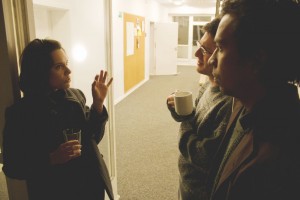
This year ECLA hosts 60 students representing 30 different countries. Students are spread out between three separate programs, each tailored for different student needs. As the campus proceeds with plans for designing new residential and study spaces, ECLA is expanding while still keeping an intimate atmosphere where everybody knows one’s name and discussions are often prolonged from the seminar classes over lunch in the cafeteria.
Students of the Academy Year program and the first year of the BA in Value Studies are focusing this first semester on a close reading of The Republic and of contemporary texts that approach the subject of education, like Homer’s Iliad, Hesiod’s Work and Days, Sophocles’ Antigone, Aristophanes’ The Clouds, Euripides’ Hecuba and Xenophon’s Hiero. The discussion stemming from these works explores core ideas for ECLA’s approach to education, related to the form in which education can be pursued and to the value it represents for human life altogether.
Veteran faculty members Ewa Attanasow and Tracy Colony, along with newer ECLA faculty members Sarah Burges Watson and Michael Weinman, will all collaborate in guiding this course. Guest lecturers will be given by Glenn Most (Scuola Normale Superiore di Pisa), David McNeill (University of Essex), Simon Trepanier (University of Edinburgh), Thomas Bartscherer (Bard College) and Julia Valeva (Bulgarian Academy of Science).
For the students who return for the second year of BA, the first semester engages with questions related to the notion of character- its meaning and its relation to the concept of authenticity and virtue. Such questions are explored through reading classical authors, such as Montaigne, as well as contemporary texts like Austen’s Pride and Prejudice and Freud’s Notes Upon a Case of Obsessional Neurosis. These seek to analyze the ways in which a good character can be acquired or even cultivated and the role it could have in building a sense of self-fulfillment.
Professors David Hayes and Sophia Vasalou will each offer a seminar based on Aristotle’s The Nicomachean Ethics and MacIntyre’s After Virtue respectively, two significant works that address the importance of a good character for a meaningful life and the way in which the notion of self and character gain their meaning in the context of social relationships.
The Project Year program continues to be concerned with the idea and ideal of objectivity. This year the focus is on the relationship between senses and knowledge. Having Leonardo da Vinci’s dictum “Saper Vedere” as the program’s motto (“Knowing How to See”), the course questions the way in which sensorial perception can guide an objective view of the perceived world, and the ways in which our perception can be distorted by preconceptions or by mental faculties.
Students, led by professors Bruno Macaes and Geoff Lehman, will have discussions which aim to shed a bit of light on the world created by human sense perception. This topic will be explored through studies of artistic works such as Claude Monet’s Rouen Cathedral, art history treatises like Gombrich’s Art and Illusion, and Panofsky’s Perspective as Symbolic Form. Other writings include works by Goethe, Baudelaire and Rilke.
The discussions developed in all classes, ambitious in the ideas put up front for debate and nevertheless not definitive in conclusions or fixed judgments, are held in a spirit of not knowing and maintaining an open-ended revision that would be held very dear to Socrates.
by Diana Martin (PY ’11, Romania)
